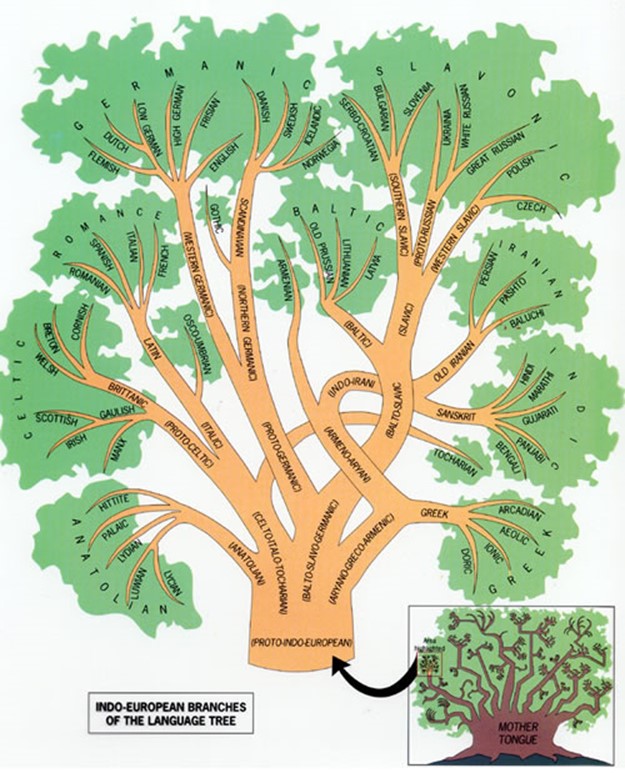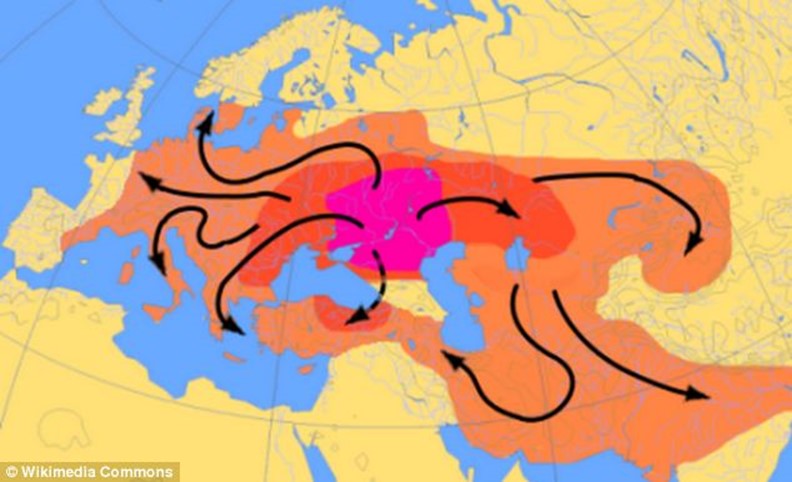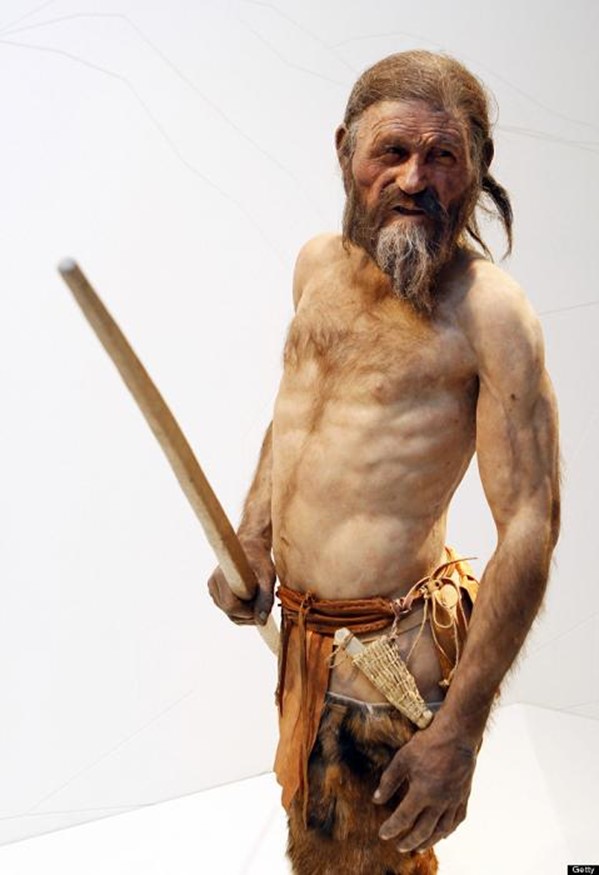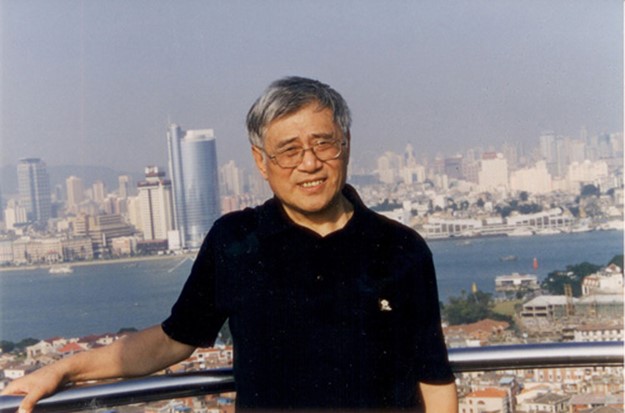"Faux Amis"节目中经常提到"原始印欧语"(PIE)——"Proto-Indo-European"。
我们说过,英语,法语中的"假朋友"基本都是"同源词"(cognate),而"同源词"的"源",常常是拉丁语等古代语言。但如果再往前追溯呢?就是"原始印欧语"啦。

"原始印欧语"(PIE)是大多数欧洲语言和印度语,伊朗语等亚洲语言的共同祖先。讲这种语言的古人居住在距今6000到8000年前的黑海沿岸地区。由于农业发展,造成人口爆炸式增长,原始印欧人被迫向外迁徙,逐渐遍布于欧亚大陆的大部。随着他们迁徙到不同的地区,他们的语言逐渐演化成了古波斯语,梵语等亚洲语言,希腊语,拉丁语,日耳曼语,斯拉夫语等欧洲语言。

英国的东方学学者W.琼斯爵士首先提岀"原始印欧语"的概念。1786年,琼斯在印度的一次演讲中指出,梵语跟希腊语和拉丁语以及古英语之间,无论是在动词词根还是在语法形式方面都显示出系统的相似点,而这种现象绝不可能是偶然的。任何语文学家都不能不承认,这些语言衍生自同一原始母语。这种原始母语就是后来人们所说的原始印欧语(PIE)
(威廉·琼斯爵士(Sir William Jones, 1746-1794)历史比较语言学的奠基人,最早提出"印欧语"假说")
"原始印欧语"是什么样的语言呢?由于年代太久远,没有留下任何文字记录,语言学家们只能根据对梵语,希腊语,拉丁语等古代语言的研究,推测"原始印欧语"的面貌:原始印欧语的名词有3个性,3个数和8个格的变化;动词有时态、语态和语体的变化,利用词缀和词干元音音变来表达语法意义;主语和动词在变化中互相呼应。怎么样?很象俄语吧?
经过几个世纪的努力,语言学家已经"构拟"出了"原始印欧语"的基本要素:语音系统,语法,词汇。今天,我们已经可以上网查阅"原始印欧语"的核心词汇和基本词根:天地,日月星辰,天气,家庭成员称呼等。本节目就曾利用PIE词根说明"假朋友"的词源, 如: *wekw- (voice), *siste-(stand),*yeu-(youth), *reg- (king), *kwo- (what), *mer- (death), etc.
有的语言学家甚至还用"原始印欧语"创作了短篇寓言故事,如:德国语言学家 Schleicher的"The Sheep and the Horses"(羊和马的故事)

但"原始印欧语"念起来是什么样子呢?
美国肯塔基大学的历史语言学家Dr.Andrew Byrd在这方面做了开拓性的工作。最近,他用"原始印欧语"录制了"羊和马的故事",复原了几千年前的声音。根据他的研究,"Proto-Indo-European is very guttural."(喉音很重)。童鞋们可以听一听下面的音频,看看是不是这样呢?

下面是"羊和马的故事"---"原始印欧语",英语和法语三种文本对照。你肯定懂的,就不翻译为中文啦。
H2óu̯is h1éḱu̯ōs-kwe("原始印欧语")
h2áu̯ei̯ h1i̯osméi̯ h2u̯l̥h1náh2 né h1ést,só h1éḱu̯oms derḱt. só gwr̥hxúm u̯óǵhom u̯eǵhed; só méǵh2m̥ bhórom; só dhǵhémonm̥ h2ṓḱu bhered. h2óu̯is h1ékwoi̯bhi̯os u̯eu̯ked: "dhǵhémonm̥spéḱi̯oh2 h1éḱu̯oms-kwe h2áǵeti, ḱḗr moi̯ aghnutor". h1éḱu̯ōs tu u̯eu̯kond: "ḱludhí, h2ou̯ei̯! tód spéḱi̯omes, n̥sméi̯ aghnutór ḱḗr: dhǵhémō, pótis, sē h2áu̯i̯es h2u̯l̥h1náh2 gwhérmom u̯éstrom u̯ept, h2áu̯ibhi̯os tu h2u̯l̥h1náh2 néh1esti. tód ḱeḱluu̯ṓs h2óu̯is h2aǵróm bhuged.
The Sheep and the Horses
A sheep that had no wool saw horses, one of them pulling a heavy wagon, one carrying a big load, and one carrying a man quickly. The sheep said to the horses: "My heart pains me, seeing a man driving horses." The horses said: "Listen, sheep, our hearts pain us when we see this: a man, the master, makes the wool of the sheep into a warm garment for himself. And the sheep has no wool." Having heard this, the sheep fled into the plain.
Le cheval et le mouton
Un mouton sans laine vit des chevaux, l'un d'eux tirant un lourd wagon, l'un portant une lourde charge et l'un portant rapidement un homme. Le mouton dit aux chevaux : "mon cœur me fait souffrir, de voir un homme menant des chevaux. " Les chevaux dirent : "écoute, mouton, nos cœurs souffrent quand nous voyons ceci : un homme, le maitre, prend la laine du mouton pour s'en faire un vêtement chaud. Et le mouton n'a plus de laine". Après avoir entendu cela, le mouton s'enfuit à travers la plaine.

其实,中国的语言学家早就对古汉语做了同样的"复原"工作。今天,我们从语言学家的研究结果中知道,上古汉语中没有"四声",没有"轻唇音"(例如:[ f ]),但有非常丰富的"复辅音",有类似屈折语的形态变化。
有些"好事者"根据语言学家郑张尚芳等人的研究结果,用构拟的古音韵朗读了"诗经"等上古文学经典。
那么,"关关雎鸠"古人念起来是什么样子呢?听听看啦~~ (^v^)
